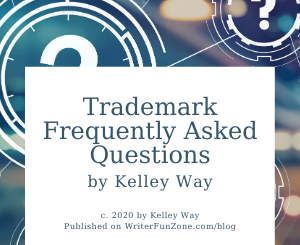Intellectual Property Rights For Novelists by Matthew Brennan
 Today on Writer’s Fun Zone we welcome Author Matthew Brennan as he gives his tips on intellectual property rights for novelists. Enjoy!
Today on Writer’s Fun Zone we welcome Author Matthew Brennan as he gives his tips on intellectual property rights for novelists. Enjoy!
****
It was a dark and stormy night. A calm crept over the house. As the rest of the family slept, you sat at the computer, working on your dream, slaving for your passion. You sat tapping at the keys until at last, your fictional masterpiece was completed.
Next came the frustration—the artist’s worst nightmare. After all the sweat you poured into your work, somebody carelessly leaked your novel to the rest of the world, and didn’t’ even stop to ask you if it might be all right. You wake up, and some third party site found your work and conveniently thought they’d publish it.
It’s easy to loose control of your intellectual property in the digital age. All it takes is careless bloggers, or aggressive Facebook fans. If your work is posted on blogs or websites where you did not give permission, you can always send an email asking the owner of the site to take it down, reminding them of your rights as the author.
If that doesn’t work, you don’t have to give up. There are courses of action in place to protect your work, so that this kind of carelessness does not debilitate you as an artist.
If all else fails, it may be time to consider taking legal action. An attorney will be able to help you understand what type of case you’ll have, and how to go about taking the proper steps to protect your intellectual property.
Before it comes to the worse case scenario, there are steps that can be taken to protect their work.
Novelists Can Copyright Their Work
When it comes to claiming intellectual property rights, novelists and other authors need to file a copyright. This is a little easier than patents or trademarks, which require more extensive legal filings.
Copyright technically occurs when something is written. However, that copyright does need to be substantiated, so there is a little bit of work required by the author. There are three easy ways to make sure that your copyright holds up.
You can use the assistance of a copyright registry that will retain the documentation of the work, should you need a legal witness. You could mail a full copy of the document to yourself with the words Copyright + Your Name on the envelope. Once you’ve done this, don’t open the document. You’ve essentially made the U.S. Postal Service witness. You could also use the U.S. Copyright office.
Indie and Self Published Books
It’s important to understand that books that are independently published or self published still fall under the author’s copyright. Whenever you utilize something like the Amazon Kindle or Barnes and Noble Nook terms of service, to understand what your rights are as the author.
Because of their very nature, eBooks can be particularly susceptible to piracy and intellectual theft.
IP Rights For Traditionally Published Authors
Novels that are traditionally published are governed by contract with the publisher. The author remains in control of the copyright, but grants specific rights to the publisher.
If you’ve traditionally published, and noticed that your work has been pirated, it’s important to notify your publisher. They may have a specific procedure in place to be able to help.
***
 Matthew Brennan is a marketing writer based in the Chicago area. He regularly writes about content marketing, blogging, and engaging with your audience. He has been published on ProBlogger, Soshable, and Business2Community. Connect with Matthew on his website, www.matthewlbrennan.com, LinkedIn, Twitter, Google+.
Matthew Brennan is a marketing writer based in the Chicago area. He regularly writes about content marketing, blogging, and engaging with your audience. He has been published on ProBlogger, Soshable, and Business2Community. Connect with Matthew on his website, www.matthewlbrennan.com, LinkedIn, Twitter, Google+.






